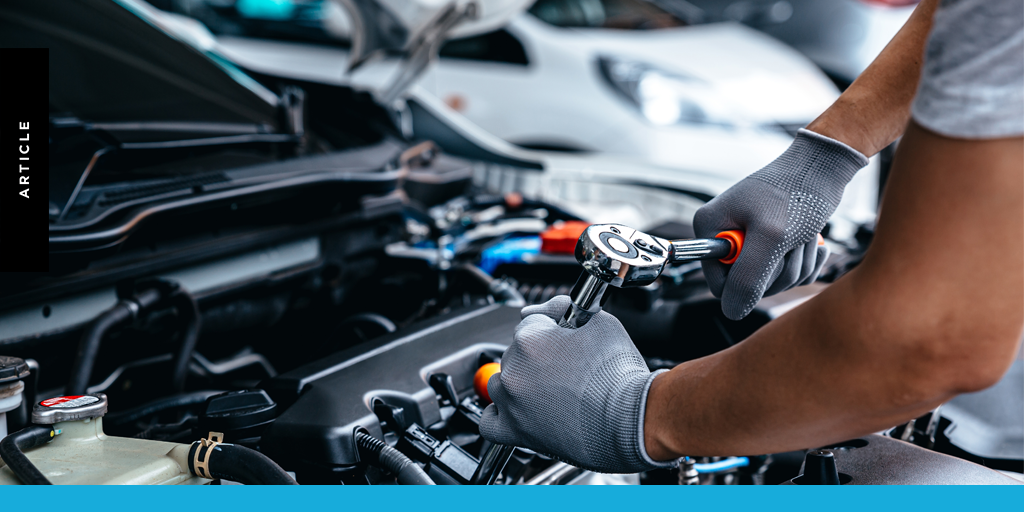Would your automotive business be able to handle these common insurance claims?
According to a range of automotive industry sources, the top claims are for:
- Business interruption, including when a business must close or slash operations due to unforeseen events
- Equipment damage, loss, or business premises disruption due to theft, vandalism, or accidents
- Public liability, when a customer or visitor is injured on your premises, or damage to vehicles in your care, custody and control
- Cybersecurity, such as if your customer and/or staff data you hold is hacked.
As an auto service business owner, you understand the essential role mechanics play in keeping vehicles on the road. With the high demand for mechanic services, protecting your business and your income from operational risks is crucial.
Having the right insurance helps ensure your livelihood is secure and shields you from potential setbacks.
Driving Deeper into the Risks Motor Trade Businesses Face
Running an auto service shop comes with its fair share of risks. These claims listed above indicate some of the risks that not only disrupt your operations, but can also lead to significant financial losses.
Workplace hazards are another major concern, with mechanics frequently exposed to harmful chemicals, experiencing slips and falls or suffering back injuries from heavy lifting. As well, road testing vehicles introduces risks of accidents, which can be costly and dangerous.
Then, there’s the staff shortages your industry faces. According to a Motor Trades Association of Australia (MTAA) report in partnership with Deloitte Access Economics, half of Australian workshops have lost a technician in the two years; a quarter have lost a master technician. Only four out of ten electric vehicle technician vacancies and two-thirds of apprenticeship vacancies had been filled.
The report found that the industry fill rate is just 39%. More than half of automotive employers surveyed said the skills shortage was an issue for them. Workshops are in dire need or motorcycle mechanics/technicians, panel beaters, diesel motor mechanics/technicians, vehicle body builders, and automotive dismantlers.
And even if your workshop is fully staffed, sourcing parts can be tricky with the current global supply chain issues.
The implications of these risks are profound. Financially, they can drain your resources through repair costs, legal fees, and medical expense. Overworked staff, and the time sink of recruiting and training new staff can also be significant issues.


Essential Types of Mechanic Insurance Policies
- General Liability Insurance: Covers premises liability, which protects you if a customer is injured on your property. For instance, if a customer slips on a wet floor in your shop, this insurance covers the medical costs and any legal fees associated with the incident. General liability also includes product liability, which comes into play if a part you install fails and causes damage.
- Workers’ Compensation: Protection for employees who are injured or fall ill due to their work. In the auto repair industry, this could mean covering medical expenses for a mechanic who suffers a back injury while lifting a heavy engine. It also provides wage replacement, so your employees are supported while they recover. This cover is mandatory for those who employ people and helps cut the risk of lawsuits against your business.

- Garage Keepers’ Liability Insurance: This policy is essential for covering customers’ vehicles under your care. If their car is damaged or stolen while on your premises, this insurance will cover the repair or replacement costs. For example, if a vehicle is vandalised overnight in your parking lot, this insurance will handle the financial repercussions, allowing you to maintain customer trust and satisfaction.
- Property and Crime Insurance: This cover protects your repair shop building and its contents against risks such as natural disasters, theft, and vandalism. This is crucial for recovering from events like a fire that destroys your shop or a break-in that results in stolen equipment. Crime insurance complements this by covering theft by outsiders and dishonest employees, ensuring comprehensive protection against financial losses from criminal activities.

- Equipment Breakdown and Business Auto Insurance: Auto repairs rely heavily on specialised tools and machinery – you might be upgrading your shop to cater for hybrid and electric vehicle servicing and repairs, for example. This coverage ensures you can quickly repair or replace critical tools, minimising downtime and keeping your operations running smoothly. Business Auto Insurance, meanwhile, covers vehicles used for business purposes, protecting against accidents, repairs, or damages. This is particularly important if you offer services like roadside assistance or mobile repairs.
Extra opt-in coverages are also available. Some important policies to consider include professional indemnity, which covers claims of negligence or mistakes in your workshop’s services. There’s also customer vehicles cover, which adds an extra layer of protection for vehicles in your care.
Bundling these coverages into a comprehensive business insurance package can provide better overall protection and often at a reduced premium cost.
Choosing the Right Insurance for Your Auto Service Business
Selecting the appropriate insurance for your auto service business involves assessing your specific risks and needs. We guide you by helping evaluate the unique hazards your business faces, such as location-based risks or the types of vehicles you service.
Consulting with an insurance broker or adviser such as us can help you identify gaps in your current coverage. We can also customise a policy package that provides complete protection for your business.
Regularly reviewing and updating your insurance policies will help you stay prepared for any eventuality.
Contact us as your broker or adviser to discuss your specific needs and ensure your business can access protection against all operational risks.

